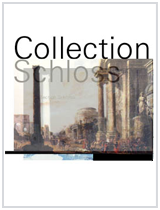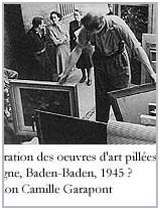
Records of the France Diplomatie Relating to Nazi-Era Cultural Property
Pour le français, voir ci-dessous.
Archives on the Spoliations committed in France during the Second World War
The French Ministry of Foreign Affairs participates fully in the activities of the public authorities regarding the restitution and compensation of cultural property looted during the Second World War by the Germany occupation authorities. It contributes in particular to research into the origin of works of art, both for the public and for its institutional partners: the National Museums section of the Ministry of Culture and Communication; and the Commission d'indemnisation des victimes de spoliations (Commission for the Compensation of Victims of Spoliation -- CIVS), which reports to the Prime Minister.
In order to carry out this work successfully, the Ministry of Foreign Affairs relies on a considerable archives collection, which is curated by the Diplomatic Archives Directorate. The Ministry of Foreign Affairs has taken responsibility for the archives of the Service des biens et intérêt privés (Department for Personal Property and Interests) (OBIP), which have been supplemented with those records created by Rose Valland during her work in France and Germany after the war, as well as by the archives of other French services tasked with locating and returning looted cultural property (Commission de Récupération artistique (Commission for Art Recovery), Office des biens et intérêt privés (Office for Personal Property and Interests), Bureau central de Restitutions (Central Office for Restitutions), Service de Récupération artistique de Berlin (Berlin Department for Art Recovery) and Service de Remise en place des œuvres d'art (Department for the Return of Works of Art). Most of the documents illustrating Rose Valland's heroic activity at the Jeu de Paume during the Occupation are to be found in the Bibliothèque et les Archives des Musées nationaux (Library and Archives of the National Museums) in the Louvre.
All of these archives are accessible to researchers (to victims' families as well as to notaries and lawyers, historians, museum curators and art trade professionals). They can be consulted at the headquarters of the Diplomatic Archives Directorate of the Ministry of Foreign Affairs, situated to the north of Paris (3, rue Suzanne Masson -- 93126 LA COURNEUVE) or online.
Because of the lack of a single, reliable inventory, as a first step, the curator responsible for the collection carries out research for information that is sought whether by French or foreign researchers.
These precious archives are fragile and of interest to a very wide audience. In 2011, in order to facilitate both their consultation and their preservation, the French Ministry of Foreign Affairs tasked a specialist in archiving and digitization of documents (the Van Dijk company) to carry out a feasibility study for the digitization and indexing of the whole archive collection.
As a first step, the Diplomatic Archives Directorate has undertaken the following tasks:
- Creation of a single searchable database. Created using Cadic software, it contains more than 50,000 records describing the content of files and providing an index of the names of owners, artists and works. The database is in a test and verification phase, but is available to French and foreign institutional partners who so request.
- Digitization of photographs, classified by owner, available in the Reading Room.
- Digitization, indexing and uploading (in 2014) of photographs of the Goering collection.
- Digitization and uploading (in 2014) of German lists (particularly from the ERR) of looted property.
Archives des spoliations commises en France pendant la Seconde Guerre mondiale
1 - Le ministère français des affaires étrangères participe pleinement à l'action des Pouvoirs publics pour la restitution et l'indemnisation des biens culturels spoiés pendant la Seconde Guerre mondiale par les autorités allemandes d'occupation. Il contribue en particulier aux recherches de provenance des œuvres d'art à la fois pour un large public mais aussi pour ses partenaires institutionnels (service des Musées de France du ministère de la Culture, commission d'indemnisation des victimes de spoliations auprès du Premier Ministre - CIVS).
Pour mener à bien cette action, le ministère des affaires étrangères s'appuie sur un fonds considérable d'archives que conserve la direction des Archives diplomatiques. Chargé des attributions du Service des biens et intérêt privés, le ministère des affaires étrangères en conserve en effet les archives auxquelles se sont ajoutées celles créées par Rose Valland dans le cadre de son activité en Allemagne et en France après la guerre, ainsi que les archives d'autres services français chargés de retrouver et de restituer les biens culturels spoliés (commission de Récupération artistique, office des Biens et Intérêts privés, bureau central des Restitutions, service de Récupération artistique de Berlin, service de Remise en place des œuvres d'art). La majeure partie des documents illustrant son activité héroïque au Jeu de Paume pendant l'Occupation est en revanche conservée par la Bibliothèque et les Archives des Musées nationaux situées au Louvre.
2 - Toutes ces archives sont communicables. Mises à la disposition de tous les chercheurs (les familles des victimes mais aussi les hommes de Loi - notaires, avocats -, les historiens, les conservateurs de musée, les acteurs du marché de l'art), ces archives sont consultables au siège de la direction des archives du ministère des affaires étrangères, situé au nord de Paris (3, rue Suzanne Masson -- 93126 La Courneuve) ou sur le site web.
En raison de l'absence d'inventaire fiable et unique, le conservateur responsable du fonds doit réaliser pour le public français et étranger concerné les recherches de références avant toute communication.
3 - Ces archives précieuses sont fragiles et intéressent un très large public. Pour faciliter leur consultation et, en même temps, les préserver, le ministère français des affaires étrangères a chargé en 2011 un spécialiste dans l'archivage et la dématérialisation des documents (la société Van Dijk) de réaliser une étude de faisabilité pour la numérisation et l'indexation de la totalité de ce fonds d'archives.
Comme première étape, la direction des Archives diplomatiques a engagé les opérations suivantes:
- la création d'un instrument de recherche unique sous forme d'une base de données. Créée sous le logiciel cadic (plus de 50000 notices décrivant le contenu des dossiers mais aussi indexant les noms de propriétaires, d'artistes et d'œuvres), cette base est en cours de test et de vérification mais elle est à la disposition des partenaires institutionnels français et étrangers qui en feraient la demande.
- la numérisation des photographies classées par propriétaires disponibles en salle de lecture,
- la numérisation, l'indexation et la mise en ligne (en 2014) des photographies de la collection Göring,
- la numérisation et mise en ligne (en 2014) des listes allemandes (en particulier de l'ERR) de biens spoliés.
Resources of France Diplomatie: Diplomatic Archive Center of the Ministry of Foreign and European Affairs
For more information about the Archive Center of the Ministry of Foreign and European Affairs of the France Diplomatie, visit the Diplomatic Archive Center website.
Return to the home page of the International Research Portal.

